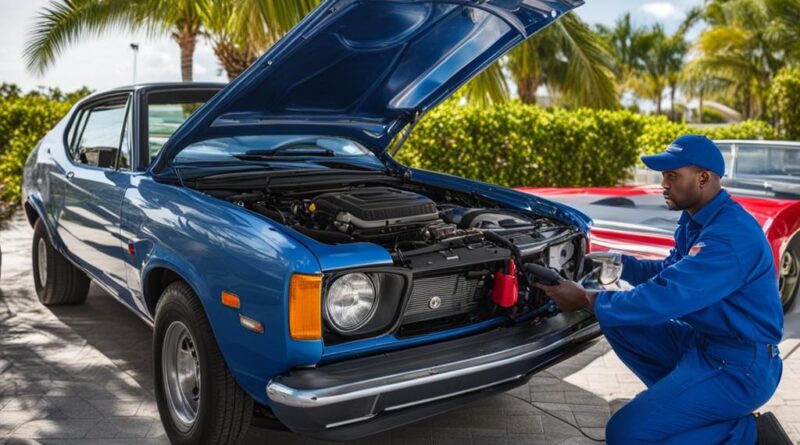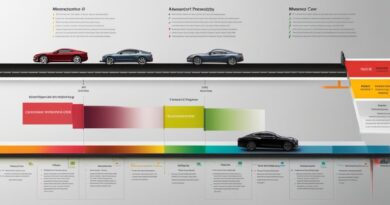Florida Car Inspection Guide – Quick & Easy Tips
For those residing in the Sunshine State, understanding the Florida car inspection process is a necessary step when considering the purchase of a used vehicle. It’s important to note that Florida does not require an annual vehicle inspection for regular drivers, marking a departure from norms established in various other states. Nevertheless, a car inspection in Florida is a critical evaluation to ensure that your potential new set of wheels ticks all boxes for safety and reliability.
Specifically, a pre-purchase automotive assessment is invaluable. Such an automotive inspection in Florida helps to identify possible issues with rust damage, engine and transmission health, and the car’s accident and maintenance history. By conducting a comprehensive inspection, Floridians can avoid the pitfalls of purchasing a car that may look good on the surface but hides costly problems under the hood.
Key Takeaways
- Florida does not implement an annual state inspection for private vehicles.
- A thorough pre-purchase inspection is essential for assessing vehicle condition and performance.
- Understanding the results of your car inspection can save you from future expenses and ensure road safety.
- Regular inspections, although not mandated, can serve as vital preventative maintenance.
- Always ensure that a certified mechanic carries out your vehicle inspection to guarantee a professional standard.
Understanding Florida Car Inspection Requirements
When it comes to maintaining the safety and efficiency of vehicles, Florida has some distinctive guidelines. Understanding these could be the difference between smooth driving and roadblocks—figuratively speaking. Let’s shed some light on the vehicle inspection proceedings in this sunny state.
What is a Car Inspection?
Vehicle inspections in Florida refer to a thorough check-up by certified professionals, aiming to determine the safety and operational status of a vehicle. This process includes checking if the vehicle adheres to state safety and emissions standards. Although the Sunshine State does not enforce mandatory annual inspections for emissions or safety, it emphasizes pre-purchase checkups, particularly for used automobiles.
Frequency and Types of Inspections in Florida
Instead of routine mandated inspections, auto inspection services in Florida are largely focused on pre-purchase evaluations. These are comprehensive and protect buyers by revealing the true state of the vehicle. Below are primary points of interest during an inspection:
- Mechanical assessments, including engine and transmission evaluation
- Inspection for fluid leaks and brake functionality
- Electrical system verifications for consistent operation
These steps ensure that the vehicle is secure, reliable, and up to par with what’s promised upon sale.
The Importance of Compliance with Florida Safety Standards
Adhering to any applicable Florida safety standards is an important aspect of a vehicle inspection. Not only does it ensure a measure of protection for the buyer, but it also contributes to the overall safety of Florida’s roadways.
| Inspection Area | Concerns Addressed |
|---|---|
| Paint and Bodywork | Identification of rust damage, past accident repairs |
| Windshield and Lights | Visibility on the road, signal functionality |
| Tires and Suspension | Road safety through tire tread assessment, suspension integrity |
| Brakes | Ability to stop safely in various conditions |
This detailed inspection approach not only safeguards your investment but also aligns with legal compliance, offering you total peace of mind.
Whether you’re purchasing a new ride or just ensuring your current vehicle remains reliable, awareness of Florida’s unique auto inspection landscape is paramount. Keep these points in mind to navigate the process like a pro, ensuring you and your vehicle are set for many sunny miles ahead.
The Pre-Inspection Checklist for a Hassle-Free Experience
Preparing for a certified car inspection in Florida is pivotal to ensuring your vehicle is thoroughly examined and any potential issues are unearthed. It’s advisable to have a pre-inspection checklist that will afford you a meticulous and structured approach to the inspection process. Below is a guide to help you prepare for the inspection effectively.
- Flashlight for examining undercarriage and dark areas
- Smartphone or camera for documenting the inspection
- Magnet to detect body filler used in rust repairs
- Tissue or cloth for checking fluids
- Note-taking device to jot down observations
It’s beneficial to take along a knowledgeable companion who can provide valuable insights and a second opinion during the inspection. They can assist in evaluating the vehicle’s condition and identify any concerns that may require further investigation. As you gear up for a certified car inspection in Florida, ensure that the following areas are exhaustively checked:
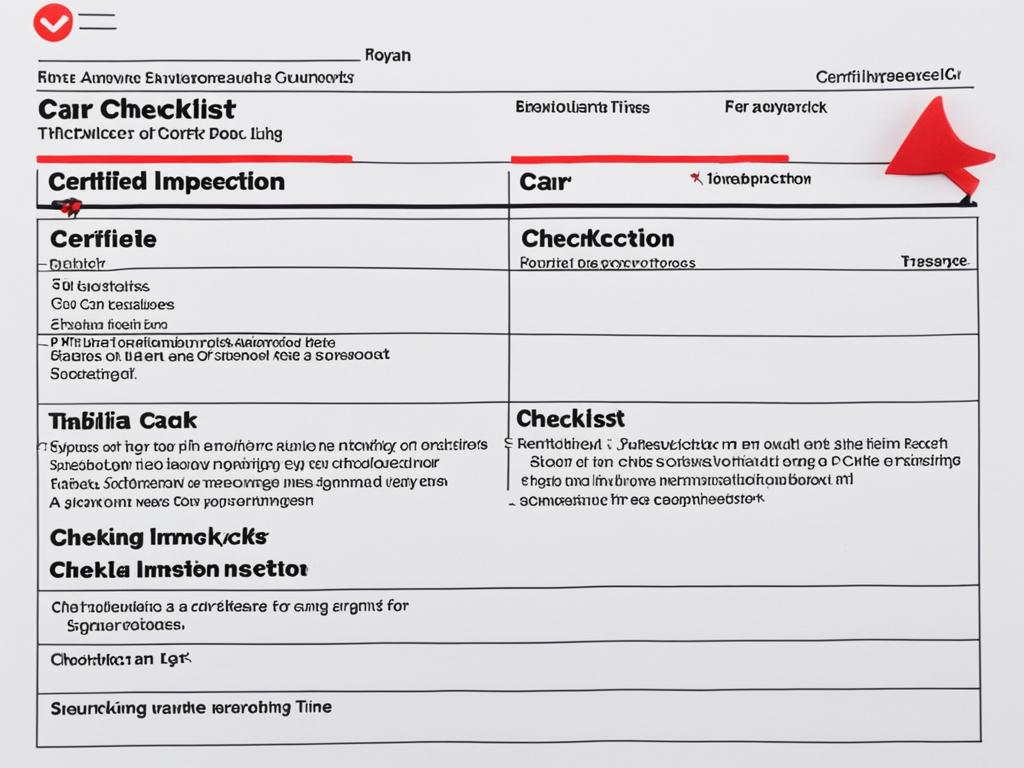
| Inspection Area | Details to Examine |
|---|---|
| Industry Defects | Ensure no known model-specific defects are present |
| Rust | Check the vehicle’s body for any signs of corrosion or rust repairs |
| Interior Condition | Investigate wear and odors that suggest excessive use or neglect |
| Engine Start Up | Listen for irregular noises and watch for exhaust smoke indicating engine troubles |
A comprehensive pre-inspection is fundamental not only to detect evident issues but also to notice subtler signs that could escape notice during a casual once-over. Always remember that a diligent pre-inspection can vastly boost your confidence when undergoing a certified car inspection in Florida.
Exterior Inspection Touchpoints
Conducting a thorough exterior inspection is a critical step in the Florida state car inspection process. This evaluation ensures that each vehicle upholds safety and performance standards before taking to the road. A comprehensive check of the vehicle’s exterior can reveal any red flags that may compromise its safety or value.
Paint, Body, and Windshield Assessment
Initial scrutiny begins with the vehicle’s paint and body quality. Technicians look for inconsistencies such as mismatched paint areas or imperfections indicating prior damage and repairs. The windshield is also carefully inspected for any cracks or chips that might impair the driver’s visibility or vehicle integrity.
Checking Tires and Lights for Safety
Quality tire conditions are vital for safe driving; hence, inspectors verify the tires’ tread depth and observe the wear indicator bars. Ensuring all vehicle lights function correctly is equally crucial. This covers headlights, high beams, indicators, and brake lights for effective communication on the road.
Reviewing Suspension and Brake Components
The suspension system undergoes testing, with focus on its ability to maintain ride quality and handle weight. The brake system is examined for its ability to perform consistently, ensuring reliable stopping power during driving. Potential fluid leaks are also identified, which could signify critical maintenance issues.
| Inspection Area | Key Points | Status (Pass/Fail) |
|---|---|---|
| Paint and Body | Check for uniform paint, body damage, and signs of accidents. | |
| Windshield | Examine for cracks, chips, and overall integrity. | |
| Tires | Assess tread depth and look for wear indicator bars. | |
| Lights | Functionality of headlights, turn signals, and emergency lights. | |
| Suspension | Perform push-down test and check for faulty components. | |
| Brakes | Review braking performance and alignment. |
Interior Evaluation: Upholstery to Dashboard
During any comprehensive Florida auto inspection, a meticulous examination of the interior is as critical as the external aspects of the vehicle. A well-kept vehicle interior not only ensures driving comfort but also speaks volumes about the vehicle’s maintenance history.
Inspectors begin by assessing the upholstery. The seats are the crux of interior comfort and their condition can indicate the level of care the vehicle has received. A methodical inspection includes checking the upholstery for rips, tears, or stains, which can reduce the aesthetic appeal and potentially signal more severe issues like mold or structural damage.
Attention is then directed towards the dashboard, a hub that should function as the brain of the car’s interior. Warning lights on the dashboard can reveal a host of issues— from engine troubles to electrical glitches. One of the primary alert signals to watch out for is the check engine light, which could potentially point to various malfunctions.
Functionality tests are crucial for all electrical components, such as window regulators, radio, navigation system, and air conditioning to ascertain there are no surprises post-purchase. This evaluation can uncover signs of internal damage, such as short circuits or worn out controllers that might not be obvious at first glance.
The presence of unpleasant odors or signs of water damage during an interior evaluation can be indicative of interior neglect or prior issues such as flooding—an important consideration in Florida’s humid climate.
| Interior Component | Condition | Potential Issues Identified | Inspectors’ Notes |
|---|---|---|---|
| Upholstery | Check for Rips/Stains | Wear and Tear | Seats exhibit mild wear; no significant damage |
| Dashboard | Warning Light Inspection | Electrical/System Issues | Check engine light off; electrical systems functional |
| Electrical Components | Functionality Test | Internal Damage | All components operational; no repair needed |
| Odor and Moisture | Presence of Odors/Water Damage | Prior Flooding, Mold, Neglect | No unpleasant odors; interior clean and dry |

Focusing on the finishing touches of an interior evaluation can significantly enhance the buyer’s confidence and ensure that the vehicle conforms to safety and quality standards. Thus, incorporating these checks into the Florida auto inspection protocol is not simply a formality—it’s a necessity for making informed automotive decisions.
A Closer Look Under the Hood
When it comes to reliable auto inspection services in Florida, a thorough check under the vehicle’s hood is a fundamental step to ensure the car’s health and safety. Florida’s warm climate and unique driving conditions demand that both the mechanical and electrical systems within the vehicle operate flawlessly. Let’s delve into the specifics of what inspectors prioritize during this vital stage of a vehicle evaluation.
Spotting Signs of Engine Wear
Inspectors are on the lookout for tell-tale signs of engine wear which could signal looming troubles. They meticulously examine hoses, belts, and other components for any evidence of deterioration or impending failure. Worn elements could compromise the engine’s ability to function optimally and ultimately affect the vehicle’s performance.
Transmission and Fluid Leak Inspections
Equally imperative is the assessment of the transmission and the inspection for any fluid leaks. Not only do experts check the transmission for smooth gear transitions, but they also verify the integrity of essential fluids. Immaculate fluid levels and the absence of contamination are a must, as they play a central role in maintaining the engine’s and transmission’s efficiency.
Ensuring Proper Function of Car’s Electrical Systems
An exhaustive analysis of the car’s electrical systems is also essential. From the vitality of the spark plugs to the reliability of the alternator and battery, each electric component must meet high standards of operation. This scrutiny guarantees the vehicle’s electrical systems are effective and robust, affirming the overall dependability of the automobile.
| Inspection Area | Checklist Items | Common Issues Noted |
|---|---|---|
| Engine Wear | Hoses, Belts | Deterioration, Cracks |
| Transmission | Gear Shifts, Leak Test | Delays in Shifting, Fluid on Ground |
| Electrical Systems | Battery, Alternator, Spark Plugs | Corrosion, Inadequate Charging, Misfires |
| Fluid Levels | Oil, Coolant, Transmission Fluid | Low Levels, Discoloration |
By offering a meticulous and transparent look under the hood, auto inspection services in Florida provide peace of mind to vehicle owners and potential buyers alike. An affirmation of a vehicle’s good health in these inspections forms the foundation of a trustworthy and safe driving experience on Florida’s spectacular roads.
Florida Car Inspection
When it comes to purchasing a used vehicle in the Sunshine State, understanding the intricacies of a Florida car inspection can be paramount. As there’s no regular state-mandated vehicle inspection program, most Floridians will only engage with this process pre-purchase, usually at a certified station.
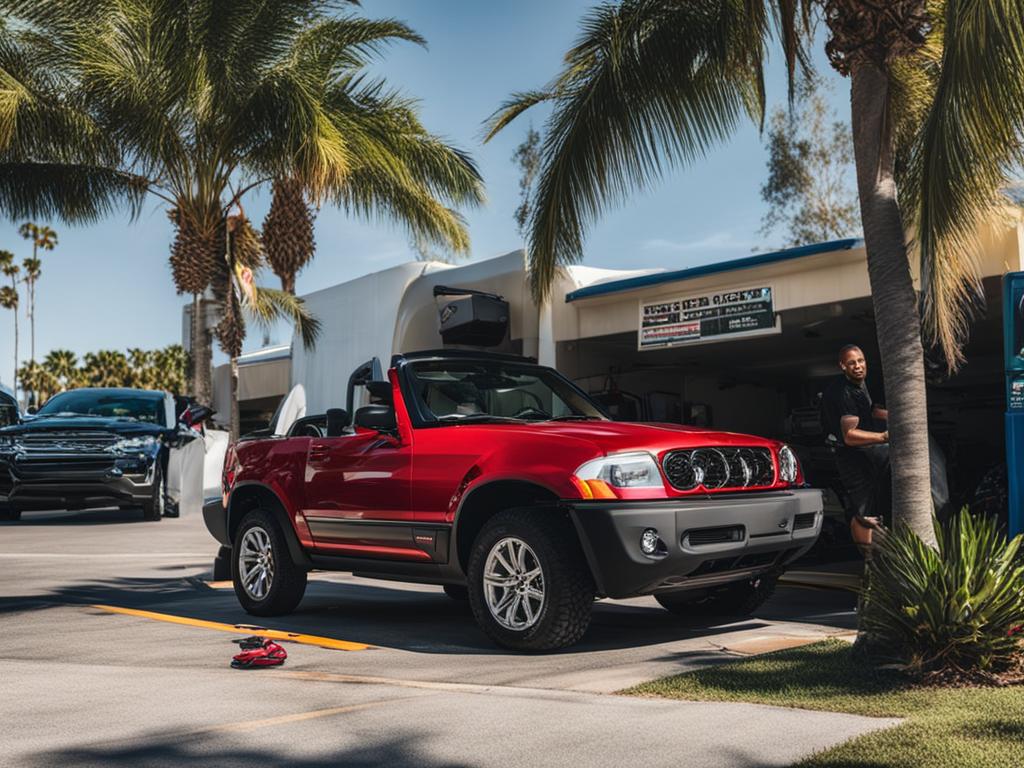
Official Inspection Stations and Certified Mechanics
It is essential to have your car examined at an official inspection station where certified mechanics can conduct a thorough and professional evaluation. This ensures that the inspection adheres to Florida’s specific safety standards and protocols, providing buyers with a reliable gauge of the vehicle’s condition.
Decoding the Results: Passing vs. Further Action
A passed inspection signifies that the vehicle is up to par with safety guidelines. However, in cases where a car does not meet these stipulations, further action will need to be taken to bring it into compliance.
How to Handle a Failed Vehicle Inspection
If a vehicle fails the inspection, the resulting steps often involve repairs or modifications to critical safety or mechanical systems. Owners are expected to remedy these problems before the vehicle can be deemed roadworthy and safe.
| Inspection Outcome | Buyer Action | Re-inspection Required? |
|---|---|---|
| Pass | Proceed with purchase | No |
| Fail – Minor Issues | Discuss repairs with seller | Potentially, based on agreement |
| Fail – Major Issues | Consider renegotiating or walking away | Yes, after repairs |
This crucial stage of the vehicle buying process in Florida protects the interests of the consumer while also ensuring that only safe and reliable cars are navigating the roads of this vibrant state.
Buying a Car in Florida: Pre-Purchase Inspections
Embarking on the journey of buying a car in Florida is a significant financial decision, and incorporating a comprehensive pre-purchase inspection is a critical step to protect your investment. This inspection is a multifaceted process that delves into various aspects of the vehicle’s history and current condition, ensuring that you are fully aware of what you are purchasing. To aid in this crucial procedure, consider the following checkpoints and professional recommendations.
Key Elements to Inspect Before Buying a Used Car
Attention to detail is paramount when examining a used car. From the exterior’s appearance to the mechanics under the hood, each component plays an integral role in determining the car’s overall worthiness. Here are the essential elements to scrutinize:
- Exterior condition, including rust, dents, and tire quality
- Quality and condition of paint and trims
- Interior maintenance and electronic components functionality
- Mechanical inspection for signs of wear or damage
The evaluation of these key elements can reveal issues that might not be immediately apparent, ensuring that your prospective investment is sound.
Professional Evaluations and Test Drives
While personal inspections are helpful, enlisting the aid of a professional mechanic can offer a more objective and technical assessment of the vehicle. This unbiased perspective is especially beneficial for identifying any concealed issues. Additionally, conducting a test drive is an indispensable component, offering insights into the engine, transmission, and handling performance that only a dynamic evaluation can provide. Here are a few primary inspection points that professionals focus on during their examination:
- Engine health, listening for any irregular sounds
- Transmission efficiency, ensuring smooth gear shifts
- Suspension and alignment, assessing ride quality and handling
- Overall driving experience, looking for any red flags
These professional insights can be the difference between a wise purchase and an expensive mistake.
The Role of Car History in Purchasing Decisions
Another facet to consider when buying a car in Florida is the vehicle’s history. A detailed report can provide a timeline of maintenance, any accident records, and recall notices, which profoundly affect the vehicle’s reliability and safety. This historical context complements the physical inspection and can influence not only the purchasing decision but also the price negotiations.
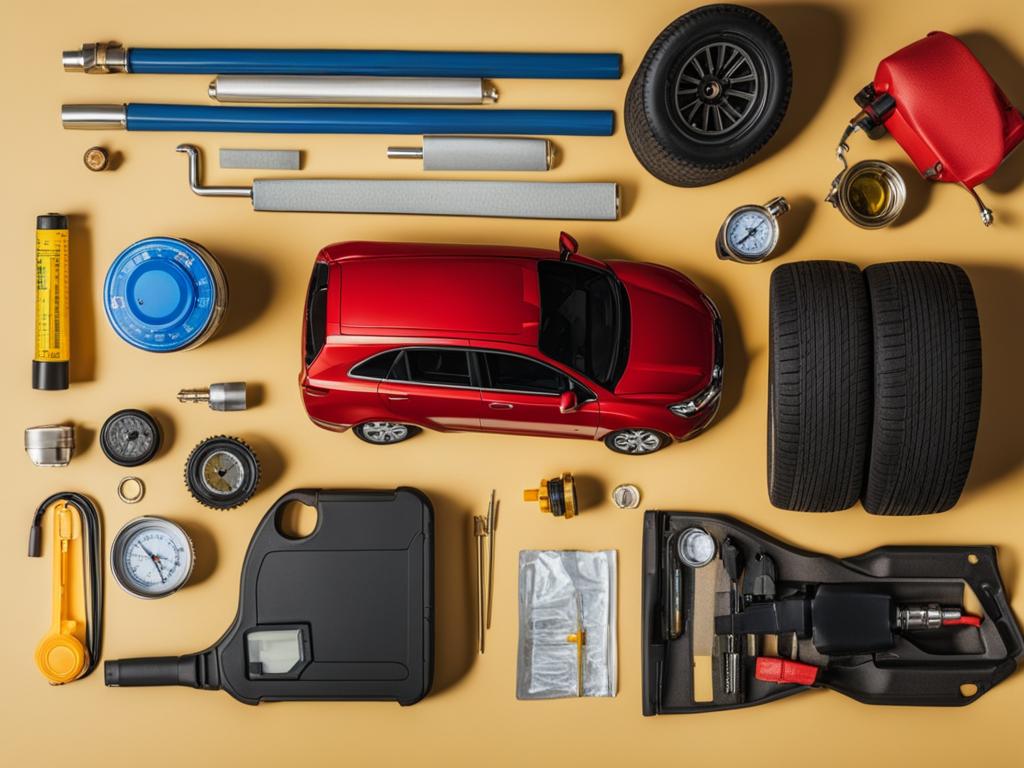
Armed with all of this information, buyers can proceed with confidence, backed by a thorough pre-purchase inspection that illuminates the true condition of the vehicle, mitigates future risks, and ensures the integrity of their investment. When considering a used car purchase, remember that due diligence is more than just a suggestion—it’s a strategy for success on the roads of Florida.
Post-Purchase and Annual Inspection Tips
For new car owners in Florida, the journey toward maintaining an efficient and reliable vehicle doesn’t end after purchase. It is essential to ensure that your automotive pride and joy remains in top-notch condition, compliant with any existing regulations, and retains its value over time. To achieve this, adopting a routine of regular vehicle inspections—even without the state-imposed requirements—is a prudent strategy that pays dividends in the long run.
Maintaining Compliance After Ownership
Despite the absence of Florida state car inspection procedures, there remain subtle ways in which inspections can support vehicle owners. Post-purchase, it is wise to stay informed about any regional automotive guidelines that could affect your vehicle’s roadworthiness. Regular checks by a certified car inspection Florida service can affirm that your vehicle not only remains safe to drive but also conforms to any specific local directives that could apply to your type of vehicle.
Yearly Inspection Renewals and Sticker Updates
Traditional annual inspection renewals and sticker updates may not be a road traveled by Floridians, yet the philosophy behind such practices holds a certain merit. These renewal systems act as a built-in reminder for vehicle owners, ensuring that inspections are performed with consistent regularity, an approach that Florida’s car owners might benefit from by voluntarily adopting.
Using Car Inspection as Preventative Maintenance
Selecting a preventative maintenance schedule through automotive inspection Florida companies can help catch small issues before they mature into serious problems. Inspections can serve as a health-check, assuring you that every part of your vehicle is in working order, thus protecting your investment and contributing to a safer driving environment.

Ultimately, even though annual inspections might not be compulsory in the Sunshine State, incorporating them into your vehicle’s care regimen is highly recommended. Taking proactive steps today with consistent car inspections can extend your vehicle’s lifespan and assure its proper function for all your Florida road adventures tomorrow.
Conclusion
In summary, the importance of a Florida auto inspection cannot be understated, particularly when it concerns pre-purchase evaluations. Although not legally mandated on an annual basis, these assessments provide essential insights into the safety and operability of vehicles in the Sunshine State. For prospective buyers, ensuring the due diligence of completing a Florida car inspection is an investment in peace of mind and future vehicular reliability.
Driving in Florida entails a sense of responsibility towards maintaining vehicle condition. Regularly engaging in vehicle inspection Florida-style signifies the driver’s commitment to safety and prevention of potential issues down the line. It’s this proactive stance that stands between seamless car ownership and unexpected troubles, reinforcing the critical nature of thorough inspections, even in the absence of state requirements.
Adopting the practice of a meticulous inspection routine, Florida motorists can uphold the integrity of their automobiles. This adherence not only protects the individual owner but also contributes to the wider community’s well-being by ensuring that vehicles on the road are not just legally compliant, but held to a higher standard of care and safety.
FAQ
What exactly is a car inspection in Florida?
A car inspection in Florida typically involves a professional mechanic checking a vehicle to ensure it is safe and complies with any applicable regulations, mainly focusing on pre-purchase inspections rather than periodic checks.
How often do I need to get my vehicle inspected in Florida?
Florida does not require regular vehicle inspections for most drivers. However, it is highly recommended to have a pre-purchase inspection done before buying a used car.
What should I look for during an exterior car inspection?
During an exterior inspection, check for paint condition, body damage, windshield integrity, tire wear, functional lights, proper suspension, and effective brakes. These are critical to assess the vehicle’s safety and condition.
What are the interior evaluation points during a car inspection?
The interior evaluation should focus on the upholstery condition, warning lights on the dashboard, and the functionality of all electrical components, including the entertainment system and lighting.
What key elements are looked at under the hood during a car inspection?
An inspection under the hood includes checking for signs of engine wear, hose and belt condition, fluid levels and leaks, as well as a review of the electrical systems like the battery and alternator.
Where can I get my car officially inspected in Florida?
If you require an official vehicle inspection in Florida, such as a pre-purchase inspection, you should visit a certified mechanic or recognized inspection station.
What does passing a car inspection mean?
Passing a car inspection means that the vehicle has met the appropriate safety and regulatory standards. A failed inspection indicates that there are issues that need to be addressed before the car can be considered compliant or safely driven.
How should I handle a failed vehicle inspection?
If your vehicle fails an inspection, you need to repair the specific problems identified in the report. After making the necessary repairs, the vehicle may need to be re-inspected to ensure compliance.
What are the key elements to inspect before buying a used car in Florida?
Before buying a used car in Florida, inspect the exterior for damage and rust, check the condition of the tires, review the paint and body for past repairs, and evaluate the interior’s state. Don’t forget to check under the hood for mechanical issues and test drive the car for performance and handling.
Are there inspection and maintenance requirements after purchasing a car in Florida?
While Florida doesn’t have mandatory annual inspection procedures, maintaining your car regularly is crucial for safety and efficiency. Consistent preventative maintenance and checks can help keep your vehicle in good condition and prevent future issues.

